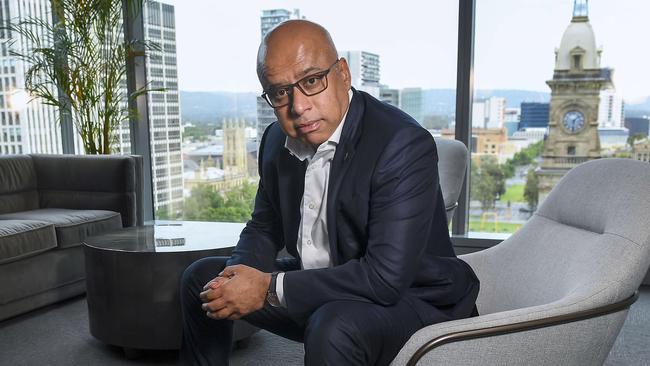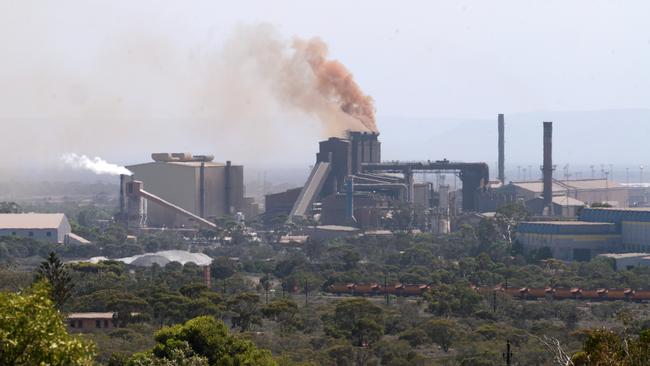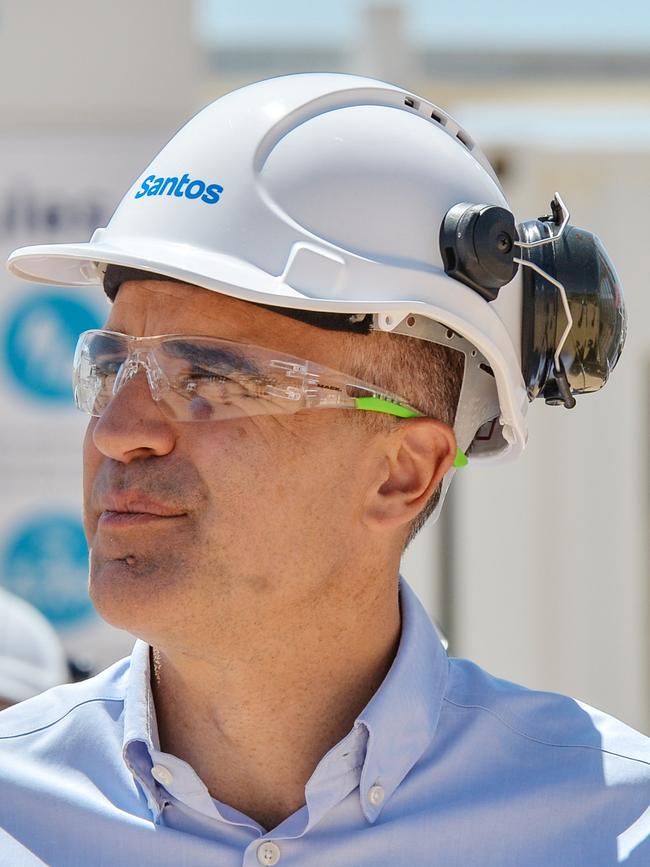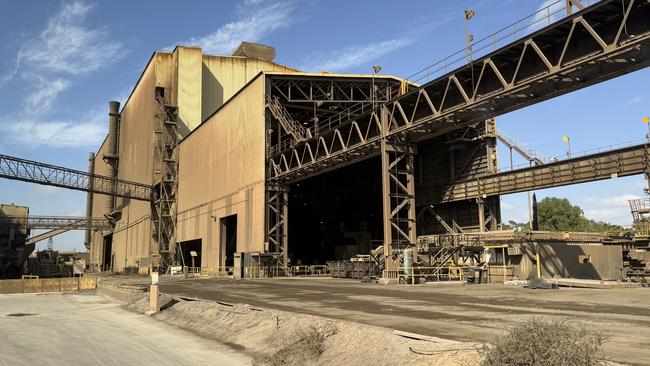‘I’ll pay my debts,’ vows Whyalla steelworks owner Sanjeev Gupta
Besieged steel giant GFG Alliance’s vow to pay back the millions owed to its many creditors has met scepticism from the South Australian government, which may yet force the company into administration.

Besieged steel giant GFG Alliance’s vow to pay back the millions owed to its many creditors has met scepticism from the South Australian government, which may yet force the company into administration.
The company on Friday announced it had settled its debts with collapsed financier Greensill Capital and would raise funds by selling its stake in the Tahmoor coal mine. But the reassurance came as there was still no timeline as to how and when GFG would pay the $350m owed from its troubled Whyalla steelworks
GFG executive chairman Sanjeev Gupta has endured a week from hell in South Australia with the Malinauskas government mounting a shaming campaign against cash-strapped GFG amid fears for the future of Australia’s only fully integrated steelworks following Donald Trump’s vow to slap 25 per cent tariffs on all steel and aluminium imported in the US.
Described bluntly by one Labor figure as a “pay up or piss off” strategy, Mr Gupta has faced sustained attacks on his established pattern of over-promising and underdelivering on his vaunted $3bn “green steel” investment in the state’s Iron Triangle.
Early on Friday that strategy appeared to have worked, with Mr Gupta issuing a statement at 6am insisting GFG was now be in a position to pay its outstanding debts. “Today’s agreement with the Greensill creditors is a great relief for GFG and all our loyal workforce and suppliers,” he said.
“It will enable us to push on from the deep challenges caused by Greensill’s collapse in 2021 and now gives us a financial platform for recovery and growth.
“With signs of improvements at our operations and some upturn in our markets, we are confident of being able to access longer-term financing to build on the significant investments we have already made in our international businesses, and to rebuild stakeholder confidence.”

But Premier Peter Malinauskas was cynical about the statement, noting past reassurances from GFG about its financial state had come to nought.
He questioned the pace with which Mr Gupta would be able to sell his coal interests and noted a lack of detail as to how and when the creditors would be paid in South Australia.
“You can’t just sell a coal mine overnight,” Mr Malinauskas told The Australian. “That’s a long process. A sale has to happen. I place far more credence in what I am hearing from people on the ground than a singular public statement from GFG.”
Opposition Leader Vincent Tarzia shared the cynicism saying: “I fear that GFG are trying to buy time.”
There is a growing view the state government wants to maximise pressure on GFG to force it into administration so that a new operator can take over the steelworks.
Mr Gupta has become almost a hate figure in South Australia this week amid revelations that GFG has failed to pay outstanding bills to everyone from the state government down.
Treasury is awaiting millions in mining royalties, SA Water is trying to recoup an unpaid $15m water bill, subcontractors are chasing outstanding invoices for work performed at the beleaguered Whyalla steelworks.
Even the Port Adelaide Football Club revealed this week that GFG – its principal sponsor – was now $1.2m in arrears with promised support.
At the same time news emerged that Mr Gupta – with whom Mr Malinauskas confirmed he had not spoken for more than a month – had been pressing ahead with the planned $10m renovation of his Sydney mansion, Bomera. Mr Gupta bought the Potts Point property in 2019 and has won development approval to install a covered pool, sauna, spa, cinema and even a yoga room and whisky room in the Italianate mansion.

Mr Malinauskas has amped up his rhetoric against GFG in the past fortnight, with its future in Whyalla dangerously intertwined with his ambitious but sketchy promise to build a $593m hydrogen plant adjoining the steelworks.
Labor figures are conceding privately that with no steelworks at Whyalla there will be no case for the hydrogen plant, leaving the project to follow Fortescue, Woodside, Origin and the Queensland government onto the hydrogen scrap heap.
But Mr Malinauskas’s sole focus this past week has been on the economic viability of GFG.
On a trip to Whyalla on Tuesday, Mr Malinauskas said the mood among many people in the town had shifted from concern to anger. “People are owed hundreds of thousands of dollars,” he said. “They’re not worried, they’re angry, and I don’t blame them.”
The first signs of the frayed relationship between GFG and the Malinauskas government emerged when The Australian revealed evidence that GFG had already extracted $430m from its Mining and Primary Steel business in Australia – which includes Whyalla – to service intra-company loans across its global GFG Alliance group.
GFG Alliance is facing huge challenges on multiple fronts abroad with creditors for collapsed former GFG financier Greensill Capital pursuing Mr Gupta for $800m.
Britain’s corporate registry Companies House is also prosecuting Mr Gupta for allegedly failing to file accounts for 76 of his British companies, a claim Mr Gupta denies and is fighting in the courts.
The South Australian government believes GFG is using Australian revenue to cover losses and debts overseas, while also being so cash-strapped that it is failing to deliver on promised investment.
Energy Minister Tom Koutsantonis said last December: “It is no shock to us or indeed the SA public that there are concerns about GFG’s finances internationally.”
But now, the charge is being led from the top down with Mr Malinauskas revealing this week that the relationship with GFG was teetering. “I would say we still have a working relationship with GFG at the moment,” he said. “But I would say there’s a, a – I’m trying to choose my words carefully here – there is a bit of a trust deficit because there are people who aren’t being paid who should be.”
Mr Malinauskas insisted he still wanted GFG to succeed.
“The 100 per cent result here is that GFG and Mr Gupta are able to recapitalise themselves quickly, pay all their creditors, and then demonstrate a plan to invest in the steelworks as they have promised ever since 2017-2018,” he said.
Asked if GFG had shown any capacity to do that, the Premier was blunt and brief: “Well at the moment no,” he said.

Mr Malinauskas also revealed his government had been talking with other operators about the possible future running of the plant, but refused to say which ones. He said the failure of the plant could not be countenanced from a national sovereignty angle, but he did not believe nationalising the plant was an option.
“What we are doing as a government is working through all our options,” Mr Malinauskas said. “There has been no shortage of uncertainty, especially on the ground in Whyalla, as to whether or not at some point they enter into administration. At this point in time that doesn’t look like it’s imminent but it would be reckless for the government not to plan for all eventualities.
“This state government is not going to allow steelmaking not to exist in this country. This is a national issue. It is madness that we could potentially be one of the largest exporters of iron ore, one of the largest exporters of metallurgical coal, and not produce steel for ourselves. We cannot be reliant on steel coming from China.
“I don’t really care who owns the steelworks. What I care about is that they have got the capacity to be able to produce steel for the country.”
Mr Gupta’s comments on Friday provoked rolling of eyes in government circles as they were largely a now-familiar plea for patience while he sorted out his finances.
“To expedite our recovery, we are vigorously finalising new financing,’’ Mr Gupta said in a statement. “Although this process has taken a bit longer than anticipated, I remain confident of its delivery.”
In a week that delivered repeated body blows to the reputation of GFG and Mr Gupta, the most devastating hit came from The Australian’s Margin Call column on Tuesday revealing the GFG owner had been unable to obtain finance for his mansion through any of the major banks, and was instead locked into a high-interest mortgage with private creditors at 12.5 per cent on an estimated $38m loan. This is leaving him with a monthly interest payment of $400,000.
This revelation was seized on by Treasurer Stephen Mullighan, who alluded to the Alan Bond and Christopher Skase era in denouncing Mr Gupta’s priorities.
“While there are so many SA businesses not getting paid, you’ve got this bloke pushing through development approvals for a $10m renovation on his Sydney mansion with a yoga room and a whiskey room,” Mr Mullighan said.
“Could anything be more offensive to those people who have slugged their guts out for decades in Whyalla than seeing this is the kind of behaviour Sanjeev Gupta is apparently involved in?
“I think Australians thought we saw the back of this kind of carry-on in the 1980s. To think this is happening at the same time people in Whyalla are having to let friends go from working at their businesses, I just can’t imagine any behaviour more offensive in the current environment.”
Despite such attacks from his Treasurer, the Premier said he still believed there was a way forward and that his line remained open to Mr Gupta. “I am not about to criticise Mr Gupta for his willingness to talk to us,” he said. “I guess though I am less interested in talk and more interested in action.”







To join the conversation, please log in. Don't have an account? Register
Join the conversation, you are commenting as Logout